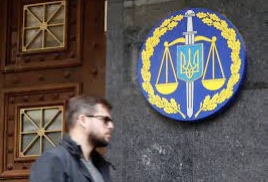As Ukraine is fighting Russia on the front lines, a much quieter battle is happening in the government offices in Kyiv: the fight to bring the long-suffering judicial reform to life.
Compared to the war, almost no one is watching this contest.
And yet it’s this battle that will define, in some ways, what post-war Ukraine looks like.
Nine years after the first efforts were made to transform one of Ukraine’s least trusted institutions, the court system, the reform still faces an uncertain future.
The need for it is more evident than ever. Just recently, the head of the Supreme Court was detained on charges of accepting a $3 million bribe.
Trusted and independent candidates have been excluded from competitions for key judicial posts, while tainted ones have been green-lighted.
“(Incumbent) judges don’t like those who go against the system,” said Halia Chyzhyk, a judicial expert that has been monitoring Ukraine’s attempts to reform the courts.
The latest judicial reform was launched by President Volodymyr Zelensky in 2019. Currently, the reform is being completed as new members of a top judicial body, the High Qualification Commission, are being chosen after years of delay.
It is still unclear if the reform will lead to any substantial change in the judiciary.
Optimists see it as a step forward despite all the drawbacks, while critics argue it is just a facade for the entrenchment of the corrupt judiciary.
Under the reform, international experts and Ukrainian officials are supposed to hire new members of two judicial bodies – the High Council of Justice and the High Qualification Commission. The new members are supposed to be independent, honest and professional people, according to the current concept of the reform, which has been in the works since 2019.
The High Council of Justice, the judiciary’s main governing body, makes final decisions on hiring, firing and punishing judges.
The High Qualification Commission, which is subordinate to the High Council of Justice, vets and nominates candidates for judicial jobs.
In 2022, a body comprising three Ukrainian judges and three international experts finally nominated new members of the High Council of Justice, and the council resumed work in January 2023, after having been suspended for a year.
The work to staff the second key agency of the reform is underway.
In March, a different selection panel comprising three Ukrainian judges and three international experts nominated 32 candidates for the High Qualification Commission. The High Council of Justice finished interviewing the candidates on May 12 and is expected to appoint up to 16 members of the High Qualification Commission on June 1.
Controversy over rejected candidates
The selection panel has stated that its assessment would be based on the principle of “positive selection” – the selection of the best of the best, as opposed to just weeding out the worst.
Chyzhyk told the Kyiv Independent that she and other representatives of civil society had promoted this principle but the selection panel had failed to implement it.
“They were supposed to choose the best but there are doubts on whether (those they chose) can be considered the best,” she said.
Several people with a positive reputation according to civil society were thrown out by the selection panel at the initial stage, in December 2022, and were not allowed to proceed to the interview stage.
At the initial stage, 64 people were chosen out of 301 candidates.
Those rejected at the beginning include Vitaly Tytych, a former head of civic watchdog Public Integrity Council, Andriy Boyko, a former reformist member of the High Council of Justice, Sergii Gorbatuk, an outspoken former investigator at the prosecutor’s office, and Lyubomyr Vynar, a whistleblower judge.
These candidates were on the list of candidates recommended by civil society to the selection panel, and yet they were rejected nonetheless.
The decision to reject Tytych raised eyebrows among Ukraine’s civil society.
He has been involved in judicial reform for many years and has often criticized the authorities for failures and setbacks in the reform.
In 2016-2018, Tytych was the head of the Public Integrity Council, a civil society watchdog that was created under the law to ensure integrity standards in the judiciary.
Due to its uncompromising stance on judicial reform, the Public Integrity Council criticized the top judicial bodies and accused them of protecting corrupt judges.
Tytych believes that the latest attempt at judicial reform has failed.
The whole system of contests for top judicial jobs has been sabotaged by corrupt interests because the authorities lack political will for reform, he told the Kyiv Independent. The selection panel for the High Qualification Commission denied the accusations of sabotage.
Another rejected candidate, Gorbatuk, was the top investigator in charge of cases involving the 2014 EuroMaidan Revolution until 2019. He has been praised by civil society for his independent stance and integrity.
In 2014-2019, Gorbatuk accused his own boss, then Prosecutor General Yury Lutsenko, as well as then President Petro Poroshenko and then Interior Minister Arsen Avakov, of sabotaging EuroMaidan investigations. Gorbatuk, who also tried to initiate a criminal case against Lutsenko over the alleged sabotage, was fired in 2019.




